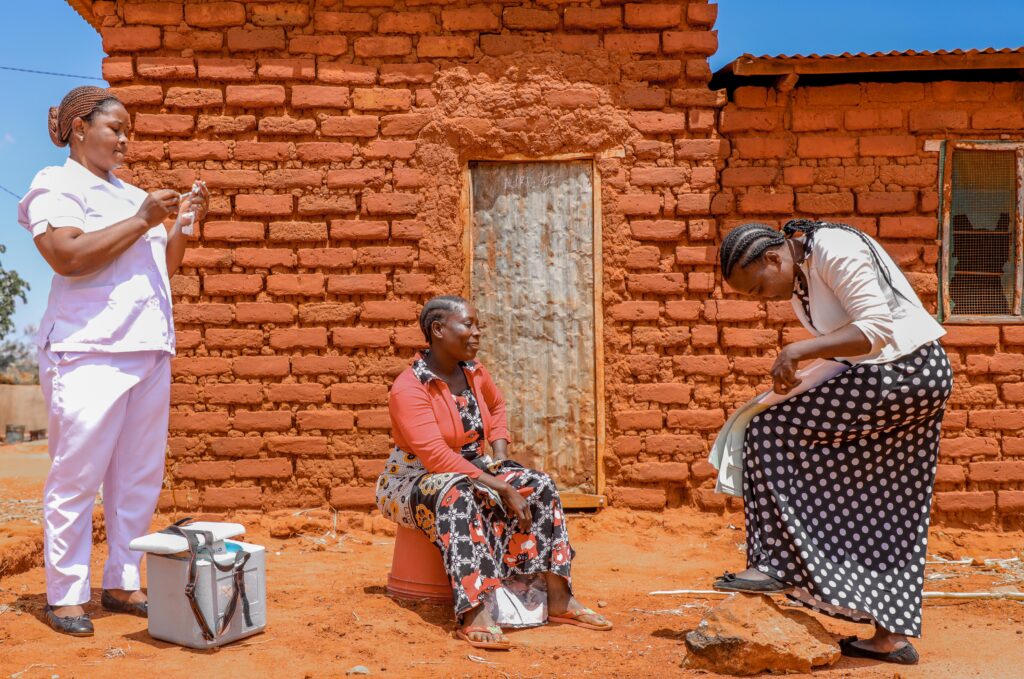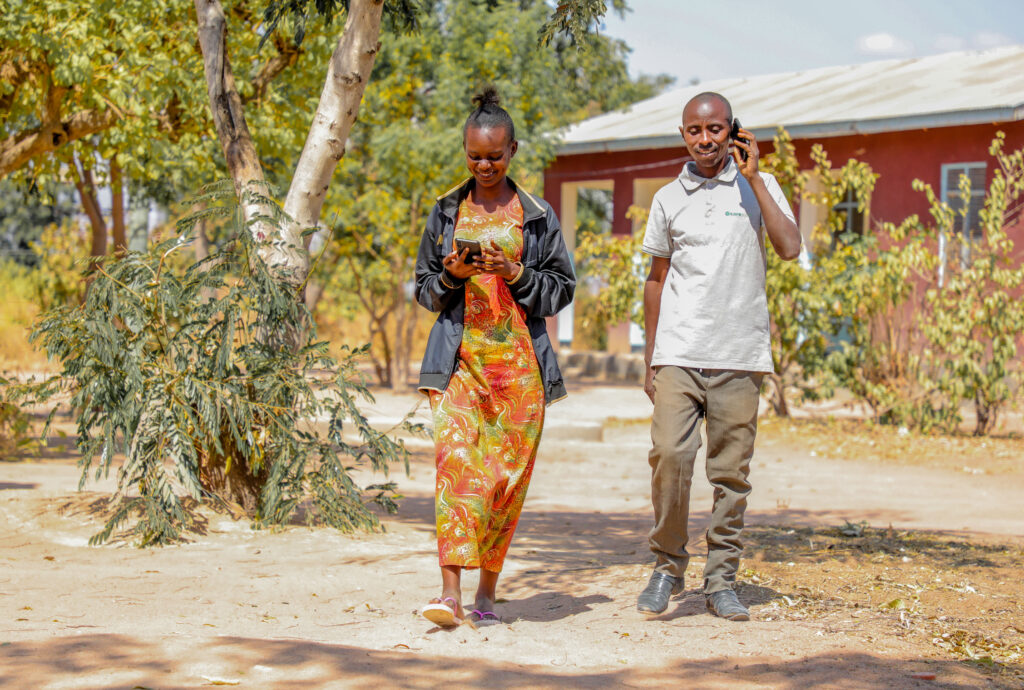Chamwino, Tanzania — It took a home visit from a community health worker for Christine Matinya, a mother of four, to overcome the misinformation and doubts she had about the COVID vaccine.
“Previously, I heard that the vaccine causes one to get crippled. I also heard that a woman would not be able to conceive and one can get blood clots,” says Matinya. “I’m a vegetable vendor and a single mother—I kept away because I imagined my family would suffer. I would come to the health facility for other services and meet the community health worker. She would talk to me but I would refuse.”
Finally, when a community health worker visited Matinya at her home and took time to discuss her concerns about the vaccine, she had a change of heart.
Now, I want to get the vaccine because of the nature of my work. Using public transport and going to the market is exposing me. The one thing that stopped me was fear. . . . I don’t fear anymore.”
Christine Matinya
Ever since the vaccination campaign began in Tanzania in 2021, health officials have been working to dispel myths and misinformation about coronavirus vaccines. While initial vaccination drives targeted priority groups such as the elderly and health care providers, over the past year, Tanzania has scaled up its health care infrastructure to expand to a wider population including younger people. In the Dodoma Region, vaccination drives also focused on hard-to-reach communities. These drives have been successful in large part thanks to community engagement and outreach efforts supported by the MOMENTUM Country and Global Leadership project, led by Jhpiego and funded by the U.S. Agency for International Development. Through MOMENTUM, the Johns Hopkins International Vaccine Access Center (IVAC) provides critical technical assistance to these efforts in Tanzania.

“When the [MOMENTUM] project began in July 2021, the vaccination rate was at 9%. We were very far from the national rate of 70%,” says Francis James, Regional Vaccination Officer in Dodoma Region, where Chamwino District is located. The vaccination drives initially took place at health facilities, but soon changed to community outreach campaigns. “Our campaign drives run between one week to ten days. During this time, we intensify our efforts and have door-to-door sessions,” he said.
“We also set daily vaccination targets for each health worker to ensure we are meeting our target. As at July 2022, our vaccination coverage for Dodoma was at 64%,” said James, adding that he was confident the team would meet the national target coverage of 70%.
Through the MOMENTUM project, Dodoma’s Regional Department of Health has received resources to support the community-based campaigns, such as vaccine transport from the national level to sub-national health facilities, and distribution of vaccination registers, tallying sheets and report cards.
Dodoma is leading in the country—we are so proud of this achievement,” says James. “The community health workers are the engine of our success because they are on the frontline, engaging with families and communities.”
Francis James, Regional Vaccination Officer in Dodoma Region
“They are truly champions and game changers,” added Dr. Mary Rose Giattas, deputy director of the MOMENTUM project in Tanzania.
Community Health Workers Support
Elizabeti Chibelenje and Lukas Madeha are both community health workers in Chamwino. They are part of the teams involved in the vaccination campaign drives. “Village meetings are useful in linking with communities, but most people shy from asking questions about the vaccine in large gathering,” Madeha says.
The health teams in this locale conduct door-to-door household visits, holding conversations about the COVID vaccine with community members. “People are more at ease in their homes,” Chibelenje explains. “We get a chance to listen to those who have concerns regarding vaccinations. We do our best to respond to the questions and address any misinformation about COVID vaccination.”

In addition to providing logistical support, the MOMENTUM project partnered with the Department of Health in Chamwino and trained 370 community health workers and village leaders. The project also supports the health teams during the campaign drives by providing fuel to transport the vaccines, replenishing commodities and supplying vaccination registers.
“We used to reach between 300 to 400 people per day. Now we are able to reach 6,000 people from the campaign drives and door-to-door household approach,” says Dr. Venus Mgaiga, the District Medical Officer. This 15-fold increase is attributed to the community-focused efforts by health workers from the 74 health facilities in Chamwino District, along with the actions of community health workers like Chibelenje and Madeha.
“60% of this number is from the efforts of community health workers. They know their community and it’s easy for them to engage directly,” says Dr. Mgaiga. “We are also intensifying our outreach to the hard-to-reach people—people out in the interior sections working in farms, and the casual workers at construction and road sites.”
The health teams in Chamwino have daily targets, all contributing toward the district and national targets of 70% vaccination coverage by end of 2022. “We have seen the benefits of the vaccination drives,” says Dr. Mgaiga.
All of these results attest to the adage, “It takes a village.” Thanks to the partnership of the Tanzanian government and U.S. government projects like MOMENTUM, and the coordinated efforts and hard work of Department of Health personnel, health care providers and community health workers, Tanzanians like Christine are getting the protection provided by the vaccine.
Consistent with the campaign’s door-to-door strategy, Christine received her vaccine outside her shop soon after the community health worker’s visit to her home had changed her mind.
“Today I’ve taken the vaccine,” she said. “I’m confident that I will be strong and work without fear.”
Joan Nduta is Jhpiego’s Senior Communications Manager, Africa Region. Frank Kimaro is the communications manager in Jhpiego’s Tanzania office.



